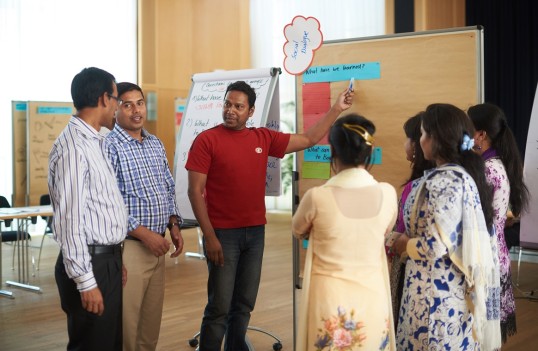Support for new accident insurance providers in Asia

Source: Stephan Floss Fotografie
In the scope of third-party-funded projects, social accident insurance experts in Germany have used their experience and expertise to help establish new accident insurance providers in Asia. In cooperation with the German Corporation for International Cooperation (GIZ), consultation and training programmes were offered to accident insurance providers in Bangladesh and Nepal.
Since 2015, the DGUV has, together with the German Federal Ministry for Economic Cooperation and Development (BMZ) and the GIZ, already been enabling tripartite delegations from Bangladesh to come to Germany to share experiences with representatives from the DGUV and learn about their principles and way of working. This cooperation was continued to pave the way for the establishment of an accident insurance provider in Bangladesh. Experts from the DGUV, several accident insurance providers, the DGUV University of Applied Sciences and the Bonn Rhein-Sieg University of Applied Sciences all took part. Over the course of the project, a strategy was drawn up for the rehabilitation of victims of workplace accidents and occupational diseases in Bangladesh’s textile and leather industry, which, with a total of around 6 million employees, is one of the most important contributors to the global market. This strategy was then implemented in the scope of subprojects between 2019 and 2020. Thanks to a great deal of commitment, the accident insurance model is now being successfully trialled on a portion of the export-oriented textile companies. This denotes the implementation of the Berlin Declaration of 27 September 2019. In this declaration, which is signed by the DGUV, the ILO and the BMZ, the Bangladesh government undertook to introduce accident insurance in the scope of a pilot project. This laid the foundations for a transition from a mere transfer of knowledge to actual implementation.
Likewise via the GIZ, cooperation with partners in Nepal began in 2020. At the time, accident insurance was still in its very early stages as a part of Nepal’s national Social Security Fund (SSF). Here, experts from the Bonn Rhein-Sieg University of Applied Sciences, including the former DGUV Department Head Professor Andreas Kranig, together with the SSF and GIZ, analysed and developed the fundamental standard operating procedures (SOPs). These were programmed according to the developed models and made available to the SSF so that the Nepalese experts could use them for their work. Training programmes with a focus on occupational diseases and workplace health and safety were also carried out in Nepal, in which a mixed group of SSF employees and partner hospitals took part. It is also planned to use the SOPs developed for Nepal for the Bangladesh trial mentioned above and adapt them as necessary.
These activities provide valuable insights in this regard to help the work of the DGUV in Germany.